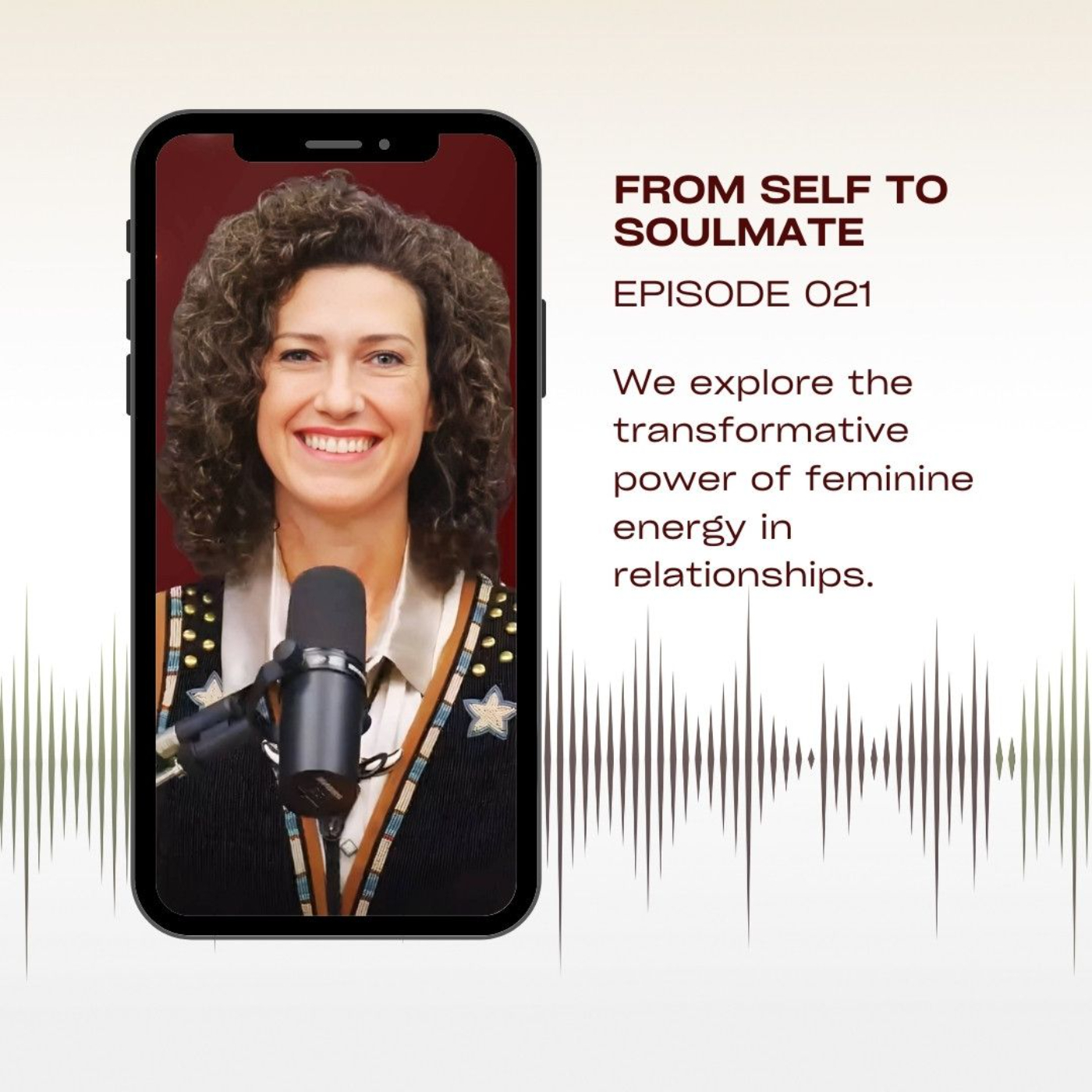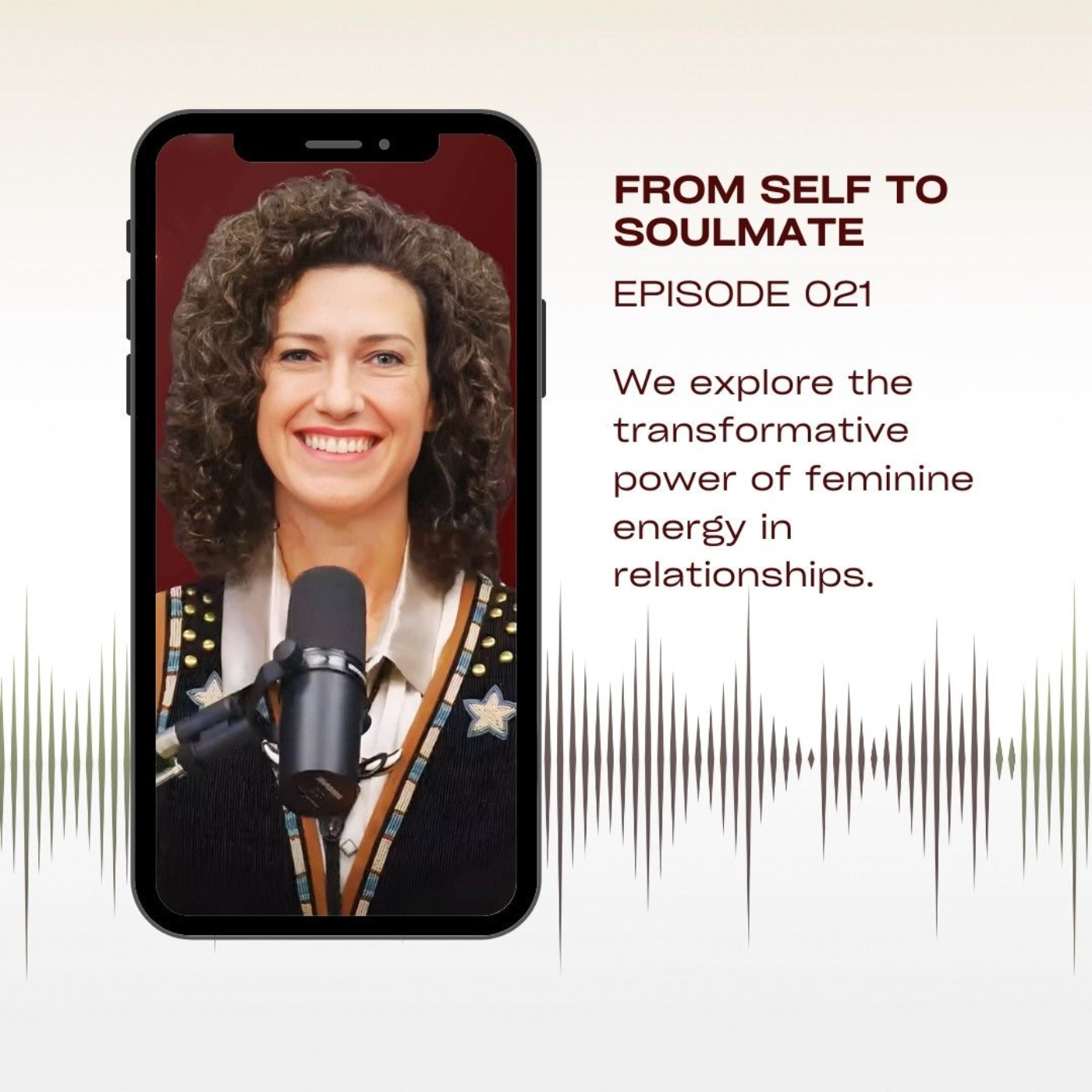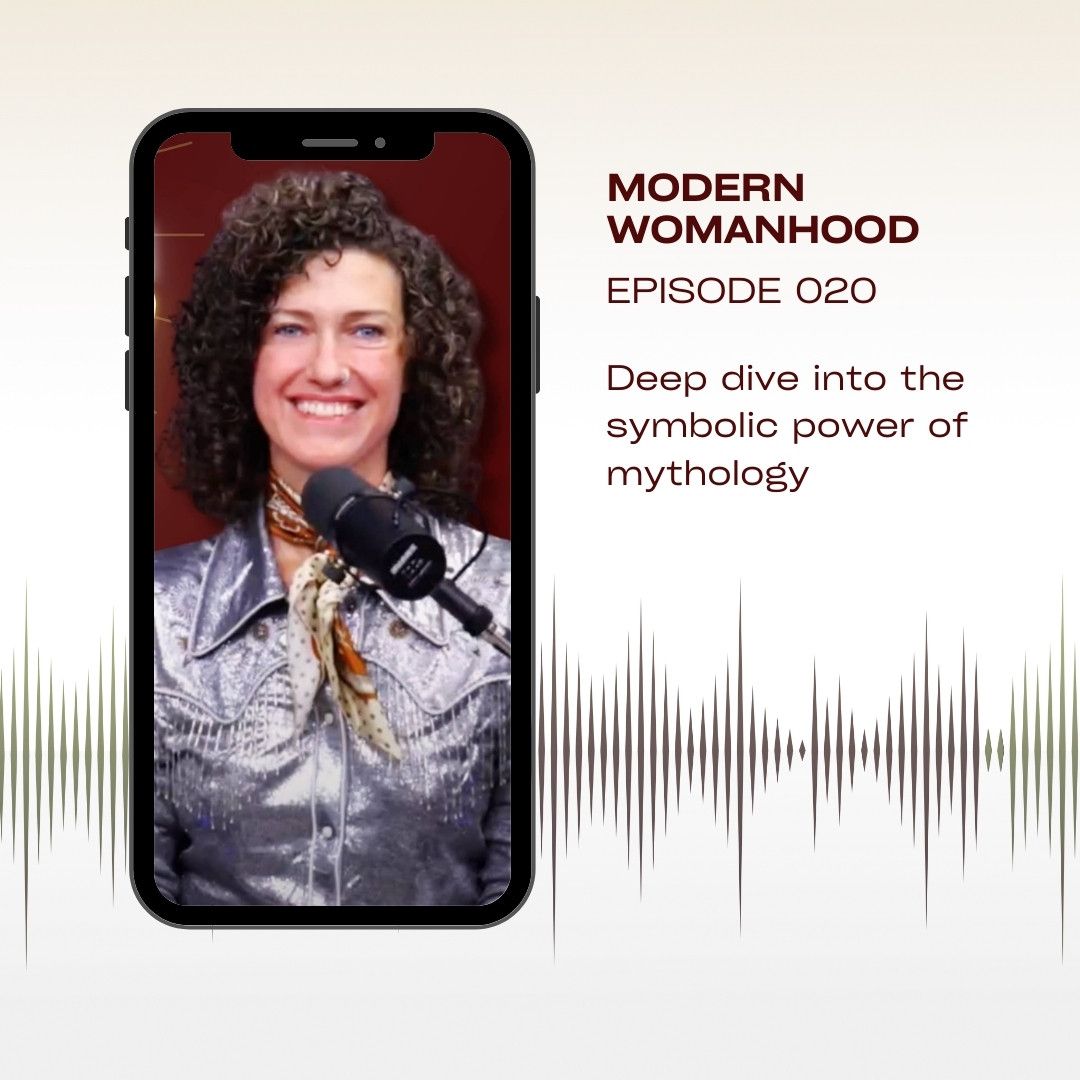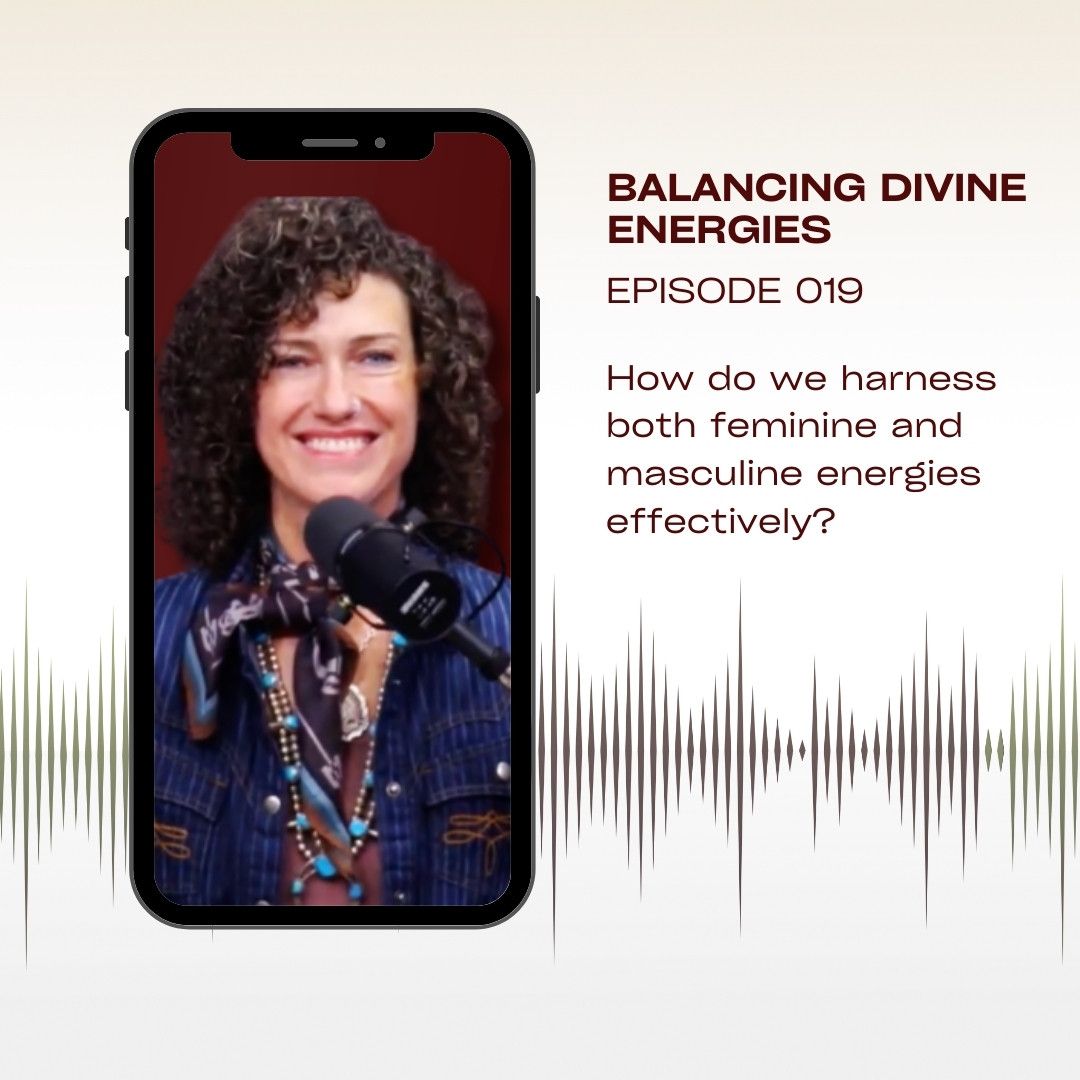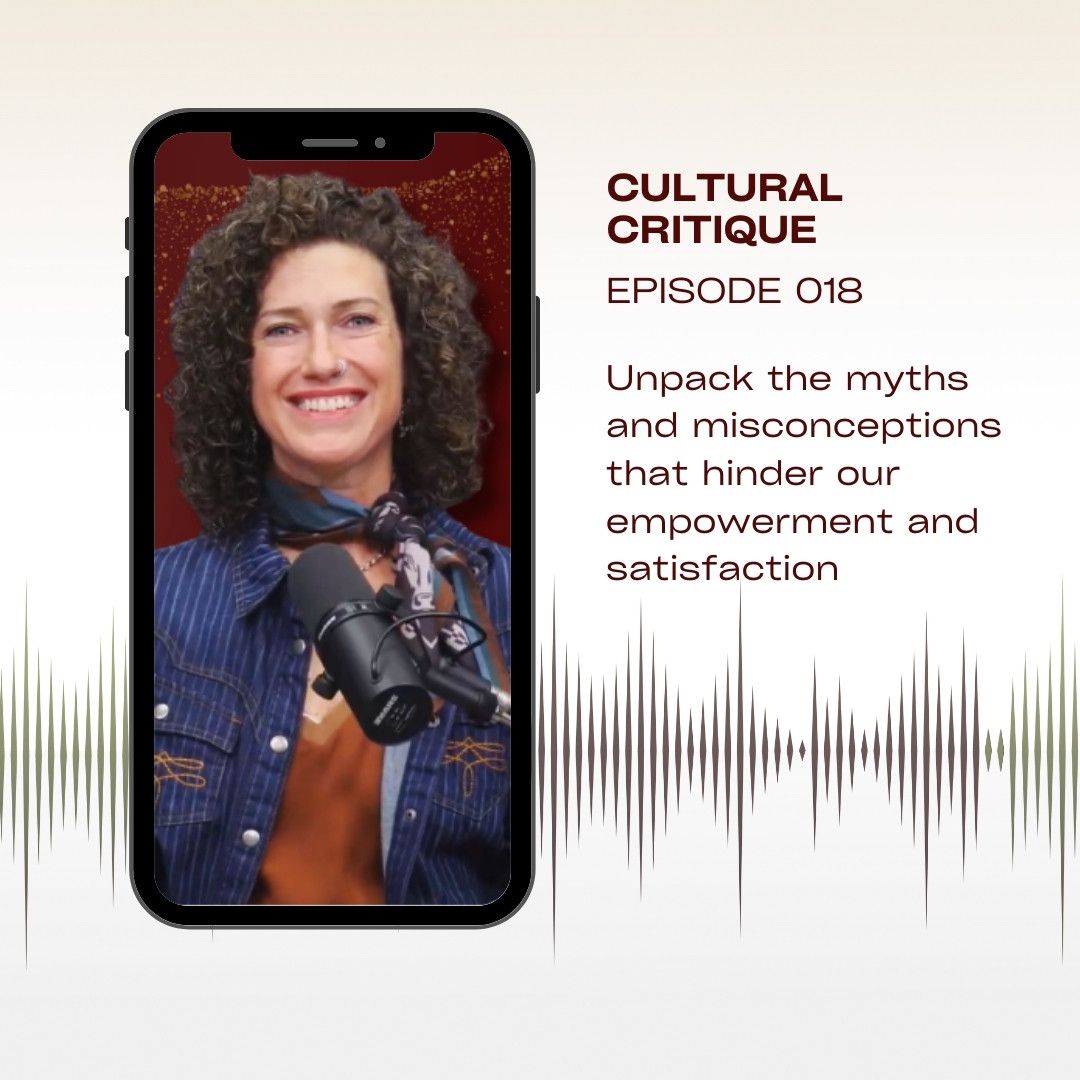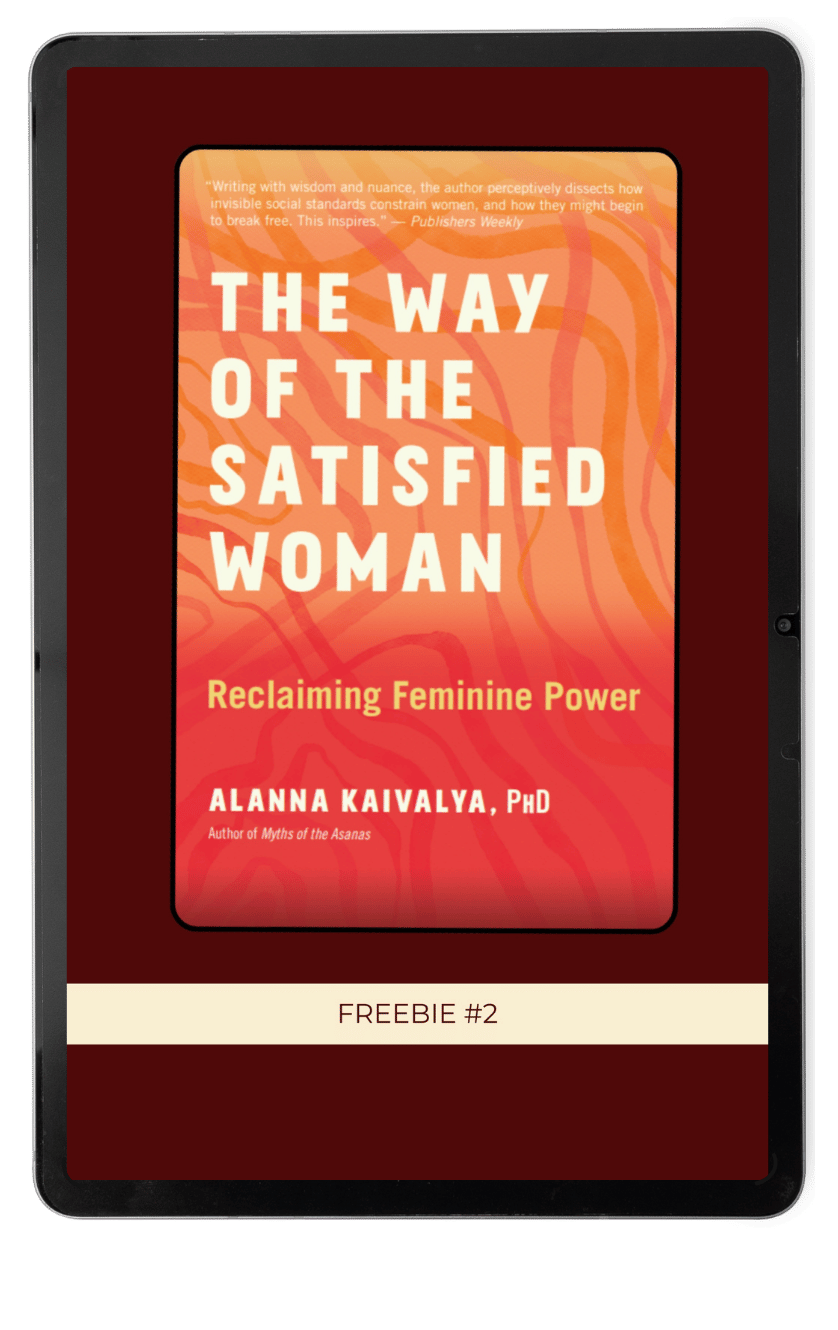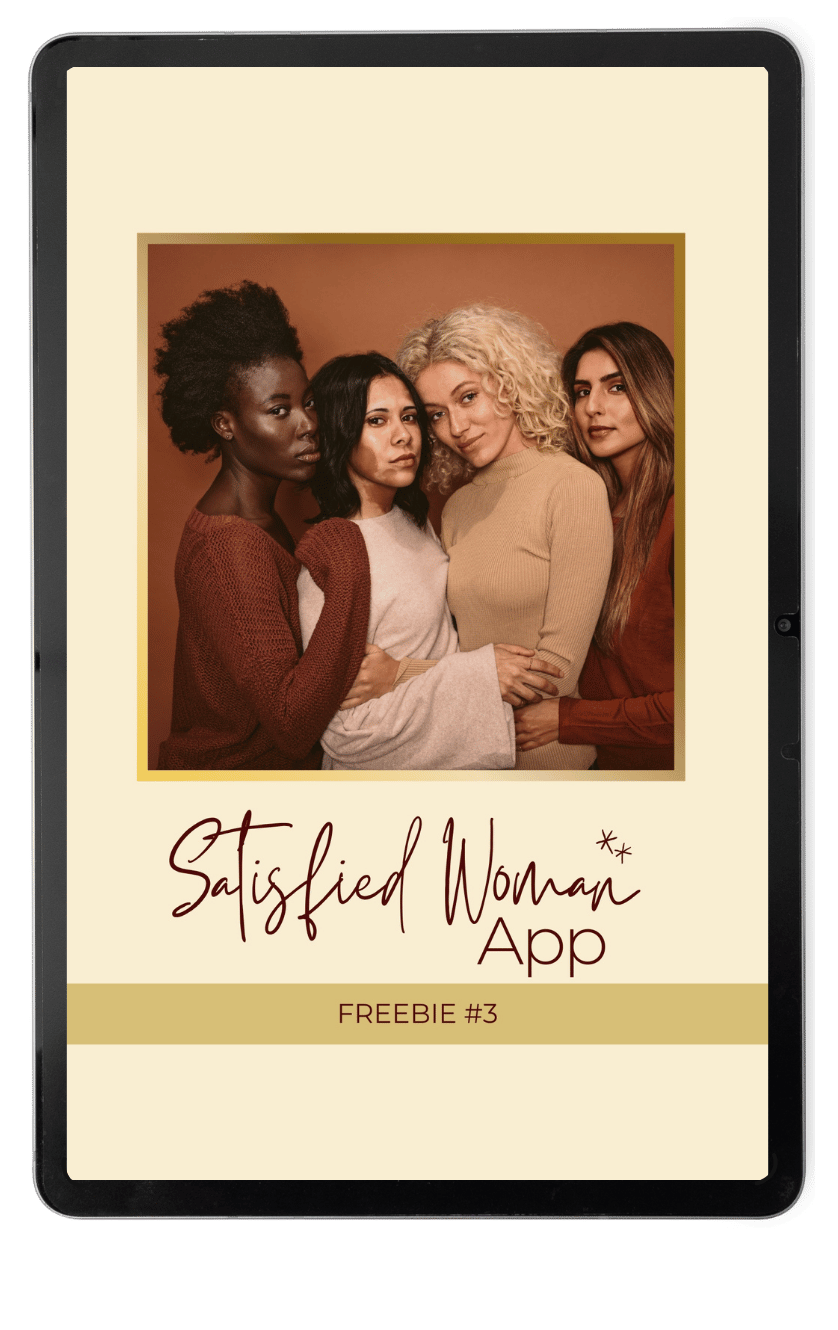0:00:02.7: One of the biggest conversations I have with women and one of the biggest questions that women have in this quest for satisfaction is finding love. Now, I know there is a very popular narrative today that says we can do it all ourselves and we don't need a man or we don't need a masculine partner. But the reality is, as humans, we are hardwired for connection and we are based in relationship. We have come this far as a species because of intimate partnership. And at some point in our lives, even the most independent woman is going to crave finding the right partner. So in this podcast, I'm gonna give you some insights as to how to go from yourself to your soulmate. Welcome to The Satisfied Woman podcast. I'm your host, Alanna Kaivalya. This podcast is dedicated to helping women lean into their femininity and rediscover the power of their feminine gifts. We take a look at what it means to be a modern woman and how we can live a satisfied life on our own terms. Visit the hub at thesatisfiedwoman.com and just for my podcast listeners, I've set up a special page just for you at thesatisfiedwoman.com/empowerme.
0:01:33.8: When you go to thesatisfiedwoman.com/empowerme, you're going to find a few special goodies that I've set aside just for you to get you started on your own path to satisfaction. So I grew up in this Western culture, patriarchy, the whole thing, just like I'm imagining you did. And one of the narratives that I've been hearing my entire life, starting from a very small girl, is that we can do it all. And we can. We absolutely can. Another one is that we can do it all ourselves. And even more is that we can do it all ourselves. And. And also for everyone else. This DIY, individualistic kind of attitude is really reinforced inside of our culture. One of the things that we prize the most in this culture is the idea of solo success, making your own way, doing it yourself. And unfortunately, that is actually one more tool to keep the feminine down. It's one more tool of dismissal and devaluation for the feminine. Because, as we know, anytime you isolate or separate groups of people, you then have power over them. So this is a subtle way that the page. Well, actually, not so subtle now that I think about it.
0:03:05.0: It's a subtle way that the patriarchy has tried to train women, that we don't need help, that we can do it all ourselves, that we don't need a man, that we can actually man up on our own. And as a result, I've noticed, and maybe you have too. We have a very interesting and new problem in our culture. More and more women are choosing to pursue careers, pursue success, and to pursue a path of aloneness as they progress into adulthood. This is very different, and I'm not advocating otherwise. Actually, just so you know, I will always advocate for what is in the highest and best interests of any woman. So if it is in the highest and best interests for a woman to pursue a path of individuality or be alone for a while, I'm all for it. If it's in their highest and best interest to pursue the career path for a while before perhaps settling down into starting a family, I'm all for it. But what I want us to let go of is this narrative and concept that the only way forward, the only way to have a successful life is to do it by yourself.
0:04:18.1: I was very much indoctrinated into this way of thinking. And because it was so prized and valued to become as successful as possible, I pursued a career path for almost 20 years at all costs. This was at the cost of my relationships, at the cost of my own happiness, sometimes even at the cost of my own integrity and self interest. Now, I say that out loud, not to start a pity party, I don't need that. But to call out the fact that I don't know, especially in my research, that this pathway of individualism and doing yourself is the most satisfying pathway for women. It's just not. So. One of the things that this podcast that you're listening to, one of the goals that I have in this particular episode is to start this conversation about women who want to be in partnership, women who want to be not independent, but interdependent, women who thrive in community and collaboration and in connection to others. Because those are the qualities of the feminine that are really not just beneficial to the feminine woman, but to everyone she's in relationship with. If we don't have an opportunity to really settle into our femininity and bring that forward specifically in relationship, the world doesn't get those qualities from us.
0:05:46.8: It's almost like we suck the life, the joy, the pleasure and the community collaboration out of the world. Because if all of us are just operating on the masculine principle, then when do we get that creativity? When do we get emotional depth and connection? When do we get the opportunity to process whatever's in us? When do we get that? If we're so hell bent on being an individual and highlighting masculine traits, then Even we, as feminine women, are missing out.
0:06:20.3: So I'm creating this course. Actually, it's already being launched. It will launch officially on February 1, just in time for Valentine's Day. Yes, sometimes I can be a little cheesy. So if you're listening to this podcast, after February 1, 2025, the course is already available to you. If you're listening to it now, then I'm hoping this podcast is going to give you some ideas, not just about what I present in the course, but perhaps even interest in joining me for the course. Because I think that this is one of the central issues of the modern woman's life. How do we not only release this masculinity that we all have to wear to get around, but how do we lean into our femininity? Because that is the key to finding your soulmate.
0:07:07.3: So I use this term soulmate well, because mostly I like it. I like the idea of a soulmate. I like the concept of soul. I'm okay if that's not a word that you prefer or if that term soulmate doesn't really resonate with you. The reason that I use it is because for me, in my work as a depth psychology study and practitioner, the idea of soul is our deep unconscious. It's all of those things within us that really make us tick, that really make us who we are. And it's that soul, that piece of us, our unconscious nature, that depth part of our psyche, that's the part of us that seeks and desires intimate connection. One of Carl Jung's famous quotes is that we are wounded in relationship and we are healed in relationship. Of course, our early wounding happens in the relationship we have to our primary caregivers or our parents or the family members who are in our household at the time. Now, I don't mean to sound morose, because literally everyone has childhood wounds, even people who come from the best households and have the best experiences. There is going to be some wounding, even if it is just the act of separating from the mother.
0:08:29.2: When you go from being an infant to being a toddler, that's the most basic wound that any of us can have. So there is going to be a wounding that is actually what makes life interesting. It's what makes ti, and it's what makes us who we are. And unfortunately, or unfortunately, the cliched idea that we all grow up to marry our parents is true. I, like you, sincerely wish that it were not true. But yes, little girls grow up to seek out and partner up or marry their fathers and little boys Grow up to seek out and partner with or marry their mothers. This is basic psychology, and we can argue against it. We can wish it weren't the case, and yet here we are. So this idea that intimate partnership is such an important key in our life is not just for the psychological purposes of healing those inner wounds. It's for co regulation. Our nervous system actually does better at maintaining a state of regulation when we are in an intimate partnership with someone we feel safe and secure with. Isn't that amazing? It actually has health benefits as well. I'm a little pissed about it, but the health benefits are greater for men than they are for women.
0:09:53.5: But they're there for women too. I think that the difference is that women actually have a lot more social interaction with other women, so they get benefits that kind of spread around when they're in community with others. But the health benefits of being in a long term, safe, happy, healthy, intimate partnership are people actually live longer. They have lower rates of heart disease, they have lower blood pressure, they have less stress overall. I mean, you know, I don't know that I need to convince you, dear listener, of the positive benefit of having an intimate relationship. But if you ever needed any kind of convincing, there's some clinical data out there saying to us that partnership is really the way that human beings thrive. And one of the things that partnership does not do, it does not diminish who we are as individuals. Codependency will do that. Certainly when we're in a relationship that features codependency, what is primarily happening is that one person sees the other as incapable of doing life on their own, that they are in need of another person for help, that they are disempowered. Anytime there's a sense of disempowerment, you know you're running into codependency.
0:11:07.7: And that is not what I'm talking about. We're not looking for codependency in intimate partnership. We're looking for interdependency where the person that we're with has their own qualities that enhance and complement ours. So this really gets to one of the cruxes of why intimate partnership is so critical for the modern day woman. And again, this doesn't mean that I'm advocating that you as a young woman, find your one intimate partner and stay with them at all costs throughout your life. I don't think we live in that world anymore. And I don't know that those are the kinds of values that every woman listening to this podcast will hold. What I am saying Is that no matter where you find yourself, at some point in your life, you are going to desire intimate partnership. There might be points in your life where you just want to be alone. There might be a deep desire to have one long term relationship. There might be a desire to have multiple at different stages. It doesn't matter, okay? The format, the cadence, the frequency of your intimate partnerships has a lot less to do with the fact that you are in them or not, and more to do with your ability to attend to them and to be honest with yourself about how important they are to you.
0:12:28.6: I mean, look, you know, when my mother divorced my father, she swore up, down, left, right and center that she would never marry again. And she swore off men. Now that lasted about six years, and then, lo and behold, she got married again. So, you know, even. And my mom is formidable. So even the most staunch feminine ladies, you're just, you're just gonna want a partnership. So what do we do about that? Well, one of the things that I speak with women often about is this, the finding of their soulmate, the finding of the right partner, because it's not even that. You know, yes, we would like to have a partnership, but you've got to find the right one. And the finding itself can be tricky because we are at a disadvantage, number one, just because we're women. But number two, because this culture has instructed us so firmly in the value of individuality and independence. Now, I will offer a little caveat here. One of the greatest pieces of advice I received when I was, I think, in my first or second year of college, it was from a mother of a fellow student of mine who had been married to her college sweetheart for decades at that point.
0:13:49.4: And I said to her, I remember this, I said, oh, wow, it must have been so nice to find the man of your dreams right away and like, tick that box and have that sorted. And she said it was absolutely nice. However, I decided that even though I knew I was going to marry this man, and even though we were in a long term partnership, that after college I wanted to live on my own for two years because I always wanted to know that I could do it. I always wanted to have that confidence. And if for some reason there was a catastrophic breakdown and he and I broke up, that I knew I could make it. And I thought that was extraordinary advice for me as a young woman. And I have a person in my family, she's my stepmother. I'm going to have to call her out and let her know that I'm Talking about her on the podcast. She had spent every single year of her life either living with her family or living with a husband or a boyfriend. There was no point at her in her life where she ever lived alone.
0:14:52.0: And then she ended up, at 69 years old, having to figure out life on her own for the first time. And it was almost like teaching someone to ride a bike. You know, you had to take the training wheels off, and there's this fear of falling. And so I see the value, absolutely, of knowing that you can be an independent woman. But what I want us to avoid is getting stuck in that. Because as independent, do it yourself at all costs, and also do it for everyone else in this culture, that kind of woman, what that requires of us is this donning the mask of the masculine. It requires us to armor up. It just does. We live in a patriarchal culture where all the messages we receive are that masculine values are more important and more valuable than the feminine. And it's not even necessarily done well, because masculine values at their best are phenomenal and an asset to every human, but because it's the patriarchy and they really are interested more in power over than power with, we often get a distorted image of those masculine values. Rather than leadership and guidance, which are phenomenal masculine values, we get domination and control.
0:16:14.1: Okay, those things are the same energy, but one is a negative distortion of the other. Right? If we can trade in control and power over for guidance and leadership, then we have a different conversation and I get to do a different podcast. But that's not what we have. So in this necessary bravado that even the most feminine woman has to put on to survive and get through every day, we sometimes get locked in to wearing this mask of the masculine. And we then present ourselves to the world as being on the masculine polarity. And that's detrimental for everybody because it denies the world of our femininity. It denies the world of our feminine gifts and power. But it also, unfortunately, gives the wrong impression. Now, I myself have experienced this, and I don't doubt that if you have not experienced it, that you know other women who have, that you are so capable and so independent in your life that you then attract men who are on the feminine polarity and who see you as so capable that they simply check out and they let you do all the work. If you've encountered relationships where the woman or the feminine partner is bossing the other around, calling all the shots, directing the show, and you see the masculine partner kind of diminishing and fading into the background.
0:17:55.5: That's exactly the trap that this kind of false masculinity leads us into. Now, I can't tell you how disorienting and disheartening this can be. I've lived it myself. I know what it's like. Because the reality is, as women who are actually on the feminine polarity, when we fake it and put on too much masculinity, we give that fake impression of the world. And what happens is it exhausts and overwhelms us. We become burnt out. We become like husks of ourselves. We become tired. We are constantly answering the demands of a world that doesn't value who we are. And it's demeaning and it's a heavy cross to bear. And I understand that it's a bit of a chicken or the egg question, isn't it? Because in order to go out into the world and do some of the things that we're called to do every day, the only way to do it is to bring forward our masculinity. But we have to downshift. We have to bring forward our femininity in as many ways and places and spaces as we can. Not only for our own sake, so that we don't have that burnout, so that we don't have that overwhelm, so that we can release and relax, but so that we actually bring in the right kind of partner.
0:19:28.0: I absolutely guarantee you that the strong, capable, masculine partner that you seek is not looking for another strong, capable masculine partner. Your strong, capable, healthy, masculine partner desires his equal and opposite. And I know that that's you. I know it because it's me, too. I have been working for decades on this work because I have felt the exhaustion of holding on to masculinity too hard and giving people the wrong impression, exhausting and overwhelming myself, and ultimately not being happy or satisfied in relationship when what I deeply crave is relationship, when what we all deeply crave is relationship, and when in relationship with the right balance of opposing polarities, we actually get to thrive even more than when we're on our own. A feminine woman on her own in this culture is always going to be at a bit of a detriment because this culture demands the masculine. And that's not fundamentally who we are. So we need that sacred space. We need someone to hold the masculine for us so that we can flourish in our feminine. We need someone who cherishes our femininity, who responds to our emotional depth, who isn't afraid when we have an emotional response.
0:21:08.2: Who is responsive to our intuition when our intuition arises. And it doesn't make any sense, it is not logical. Our logical masculine partner heeds it and makes decisions based upon it. This is what we might call a power couple. When you have two human beings, regardless of gender orientation, anything else, one fully in the masculine and one fully in the feminine, they actually get to be in those things more of the time because of the nature of the relationship, and they get to do each of those things better. And it's almost like we can outsource that hyper masculinity so that we can bring forward our incredible femininity. Let's just let our masculine partner handle it. We don't need to protect ourselves because we've outsourced it to our very capable masculine and they have the ability to protect us physically, emotionally, psychologically. Any level of protection that is important to you, you can outsource that incredible masculine trait of guidance and leadership. You no longer have to make all the decisions. The masculine loves leading, guiding, decision making. And the best of the masculine will be responsive to the needs of the feminine and make decisions accordingly.
0:22:38.4: I mean, I don't know about you, but this sounds pretty dreamy to me. And none of this has us relinquishing our agency or our power. Because as a feminine woman, our power actually lies in our femininity. It lies not in our ability to have hyper direction or overly logical thinking. We can have that. Remember, all human beings have both masculine and feminine within them. So when those things are necessary, yes, we can call them forward, yes, we can employ them. It doesn't mean we just get to check out of those things. But we are stronger as feminine women when our logical thinking follows our emotions and intuition, when our emotions and intuition are at the forefront driving the logic and the decisions. And in relationship, when our emotions and our intuition are the prized like secret magic of how decisions are made in relationship and executed by the masculine. This symbiosis, this allowing each individual to really play to their strengths is beneficial for everybody. And it is how, it is absolutely how we as women are going to heal those deep wounds that are inflicted on all of us as little girls. I like to say as a result of my psychological training and studies, that no one gets through childhood unscathed.
0:24:15.0: But what I add now in doing this work is that especially little girls don't get through childhood unscathed. We have deep work to do inside. Now good news is, as the feminine, we are most equipped to do it. The feminine loves depth work. The feminine loves diving into the shadow and taking a look at the unconscious, because that's where our creativity is, that's where we flourish, that's where we shine. That's where we access our emotions and our intuition. That's our space. But for us to do that shadow work really does require intimate, appropriate, healthy and sacred partnership. Now, I wish it weren't the case. I remember, I think it was probably 2012, 2013 or so. And in my past life, I taught a lot of yoga and spirituality and have been studying psychology for this whole time and was no stranger to doing all sorts of spiritual and psychological therapeutic practices in order to heal all the best wounds that I could find and do the work and, you know, walk the talk, as it were, that I was doing. And I remember, you know, as a regular meditator, going to therapy regularly for that point, probably 15 years, leaning into shadow work, training people in this work through my courses.
0:25:44.7: I remember I was in my bedroom and I lived in New York City at the time. And I looked at the mirror and, you know, my whole day was dedicated to spiritual practice and work. And I looked in the mirror and I just had this realization. It's like stark moment of realization. And I literally looked at myself and said, Alanna, you've actually taken yourself as far as you can go. And to go any further, you are going to need a mirror. You're going to need somebody else to hold that lens up for you. And that happens in intimate partnership. Nothing is going to heal you and allow you to transform yourself as having the right intimate partner. Someone who can hold your pain, someone who doesn't let you get away with your BS. Someone who, when you are triggered, does not get triggered themselves and holds you so that you can heal and take a look at that trigger and that wound. Someone who knows you so well that they understand what they may need to psychologically protect you from and not pull those triggers. This is the next level of depth work. It comes through intimate partnership.
0:26:57.9: Now, I know that might be overwhelming. It puts you on the hook for finding the right person to help you do this. But I promise that you can. And I also absolutely know that the only way you can is by bringing forth your femininity, by connecting to your emotions and to your intuition, by letting your. Your deep feminine self guide you. This is how you find this soul mate to do this work with. So make sure that you start thinking about this and considering it and finding ways to enhance your femininity so that you attract the right partner, so that you can continue on the Very important work, which is healing yourself. Right. It's like, it's amazing how much is wrapped up in this simple idea when you know, you're probably sitting there thinking, I just want to find a cool boyfriend or a cool masculine partner. Yes. And by the way, this unlocks a whole new world of potential for you. So you want to start doing the work, girl? Let's do it. Listening to this podcast is one way to begin. Another way is reading the book The Way of the Satisfied Woman. Yes, I wrote that going to my website, thesatisfiedwoman.com.
0:28:16.0: Nd specifically for you podcast listeners, thesatisfiedwoman.com/empowerme. And I have my new course, From Self to Soulmate, which is designed specifically to give you the tools and tips and tricks that you need to get into your femininity to attract the right partner. It's gonna give you a checklist on exactly what kind of partner you are looking for, how to recognize the healthy masculine, and how to be ready for that one, your one, when he appears. So remember, the course launches on February 2nd. You're welcome to get in early. I've got some advance bonuses for those that you do. For those that do. And if it's after February 2nd when you're listening to this, then the party has already started, girl, and we are waiting for you to join. Thank you so much for listening to this podcast today. I am so grateful to be able to do this work with you for you, and I am doing my best to bring the best of this work to you through everything that I do. So here's to all of us working together to walk the path of the Satisfied Woman.


